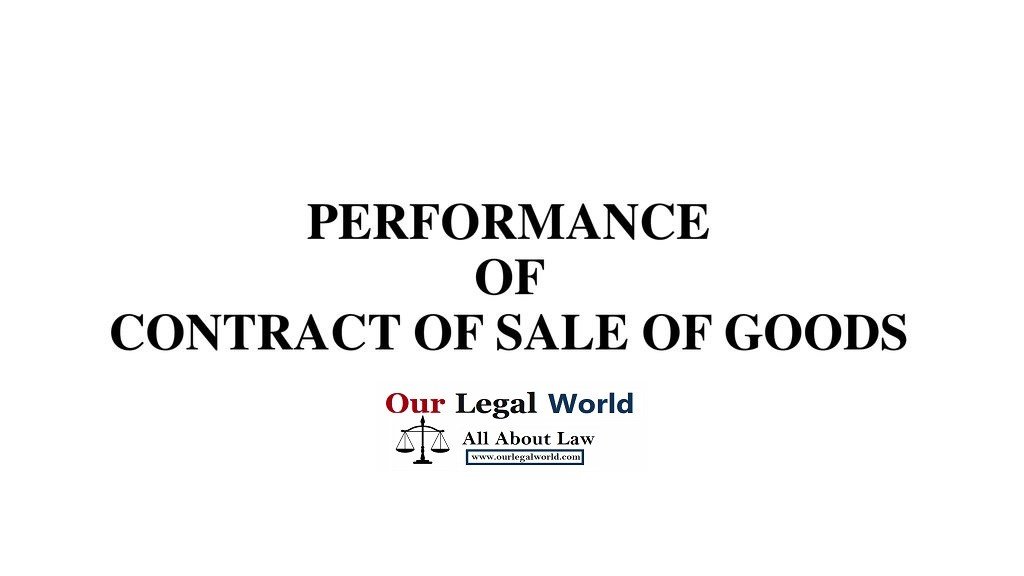Performance of the Contract of Sale under the Sale of Goods Act
Introduction
Before 1 July 1930, The Sale of Goods Act 1930 was the part of the Indian Contract Act 1872. After the State of Jammu and Kashmir was declared as Indian territory in 2019, this Act is also applicable in the whole India including the state of Jammu and Kashmir. This Act was known as ‘The Indian Sale of Goods Act’ in the earlier of 1930. Later the Act was amended in 1963 and named as ‘The Sale of Goods Act 1930’.
The performance of the contract of sale deals in chapter 4 from Section 31 to Section 44 of The Sales of Goods Act 1930. The process of displacing the goods and how the possession of goods are being transferred from one person to another voluntarily is described in these Sections. For a legal agreement, the parties are the main essential element. In the contract of the sale of goods, there are two parties, one is the seller and the other is the buyer. There are some criteria on which the parties are performing the contract, which is going to be discussed in this article.
Who is a seller
According to the Section 2 (13) of the Sale of Goods Act, 1930, “seller” means a person who sells or agrees to sell goods. In general term, the seller is a person by whom the goods are going to be sold.
Rights of the Seller :-
- He has the right to assume that the buyer has accepted the goods or not.
- He has the right to reserve the right to disposal the goods until the fulfilment of the conditions of the contract and the payment of the goods.
- The delivery of the goods takes place only when the buyer would apply for the delivery.
- The possession of the goods will remain to the seller until payment of the goods.
- The arrangements for the installation of delivery of the goods should be made when the buyer agrees to so.
Under certain circumstances he has the right to resell the goods.
- If the delivery of the goods not take the place to the buyer, the seller has the right to bring the goods again in his possession.
- He also has the right to sue the buyer on the failure of the payment as according to the conditions of the contract.
Duties of seller
- There should be proper arrangements for the delivery of the goods to the buyer.
- The seller has the duty to check that the goods are properly delivered or not.
- There should be a proper title of the goods which are going to be delivered.
- The delivery of the goods should be according to the conditions of the contract.
- The seller should ensure that the goods supplied should be agreed to the implied condition and warranties.
- The seller has a duty to keep the goods in a deliverable state until the buyer asks for the delivery of the goods.
- The seller has a duty to bear the expenses of delivery of the goods.
Who is a buyer?
According to the Section 2 (1) of the Sale of Goods Act 1930, “buyer” means a person who buys or agrees to buy goods. In general terms, the buyer is a person to whom the goods to be sold.
Rights of the Buyer:-
- The buyer has a right get delivery of the goods according to the contract.
- If the quality and quantity of the goods is according to the contract, the buyer has a right to reject the goods delivered.
- The buyer has a right to be inform when the goods are to be sent by sea route, so he may make arrangements for their insurance.
- He can examine the goods for checking whether they are in the agreement with the contract.
- On the failure of the delivery of the goods after the payment is made, the buyer has a right to recover the price.
- If there is any breach of the warranty and the condition of the goods he has a right to sue the seller for the damages.
- The buyer also has a right to sue for the damages to the seller of breach of contract.
Duties of the Buyer
- If the seller made all the arrangements to make the delivery of the goods according to the contract, the buyer has a duty to accept the delivery of the goods.
- If there is any failure on the part of the buyer, he should bear the risk.
- If the delivery of the goods is as according to the contract, he has to pay the price for the same.
- He has to pay for not accepting the goods.
Performance of the Contract
The performance of the contract takes place when the seller and the buyer have performed their duties. The duty of the seller is to deliver the goods and that of the buyer to accept the goods and pay for them in accordance with the contract of sale.
Unless otherwise agreed, payment of the price and the delivery of the goods and concurrent conditions, i.e., they both take place at the same time as in a cash sale over a shop counter.
Delivery is the voluntary transfer of possession from one person to another. Delivery may be actual, constructive or symbolic. Actual or physical delivery takes place where the goods are handed over by the seller to the buyer or his agent authorized to take possession of the goods.
Constructive delivery takes place when the person who is in the possession of the goods acknowledges that he holds the goods on behalf of and at the disposal of the buyer. For example, where the seller, after having sold the goods, may hold them as bailee for the buyer, there is constructive delivery.
Symbolic delivery is made by indicating or giving a symbol. Here the goods themselves are not delivered, but the “means of obtaining possession” of goods is delivered, e.g, by delivering the key of the warehouse where the goods are stored, bill of lading which will entitle the holder to receive the goods on the arrival of the ship.
Rules as to delivery
The following rules apply regarding delivery of goods:
- Delivery should have the effect when the buyer in possession.
- The seller must deliver the goods according to the contract.
- The seller is to deliver the goods when the buyer applies for delivery; it is the duty of the buyer to claim delivery.
- Where the goods at the time of the sale are in the possession of a third person, there will be delivery only when that person acknowledges to the buyer that he holds the goods on his behalf.
The seller should tender delivery so that the buyer can take the goods. It is no duty of the seller to send or carry the goods to the buyer unless the contract so provides. But the goods must be in a deliverable state at the time of delivery. If by the contract the seller is bound to send the goods to the buyer, but no time is fixed, the seller is bound to send them within a reasonable time.
The place of delivery is usually stated in the contract. Where it is stated that the goods must be delivered at the specified place during working hours on a working day. Where no place is mentioned, the goods are to be delivered at a place at which they happen to be at the time of the contract of sale and if not then in existence they are to be delivered at the place at which they are manufactured or produced.
The seller is bound to bear the cost of delivery unless the contract otherwise provides. While the cost of obtaining delivery is said to be of the buyer, the cost of putting the goods into a deliverable state must be borne by the seller. In other words, in the absence of an agreement to the contrary, the expenses of and incidental to making delivery of the goods must be incurred by the seller, the expenses of and incidental to receiving the delivery must be borne by the buyer.
If the goods are to be delivered at a place other than where they are, the risk of deterioration in transit will, unless otherwise agreed, be borne by the buyer.
Unless otherwise agreed, the buyer is not bound to accept delivery in instalments.
Remedies in the failure of performance of the contract:-
If there is any failure regarding the performance of the contract the remedies are also available for the same. There is a legal maxim ‘Ubi jus ibi remedium’ which means ‘there is a right there is remedy’. If a person is aware about his right only when he is entitled to get the remedy. If there is any failure in the part of the seller regarding to the performance of the contract, the buyer can reject the goods, sue for the damages. If there is any failure on the part of the buyer, the seller has the right to deny the contract, sue for the damages.
If any party may sue for the damages, there are various remedies available to them. Such as quantum merit, punitive damages, nominal damages, general damages, special damages, etc. The remedy for the damages is based on the nature of loss or damage and the conscience of the party. If the parties to the contract do not want to sue for the damages, no one can claim or force them to claim for the damages.
JUDICIAL INTERPRETATION
Singh v. State of UP and ors., AIR 1981 AII 103
Section 18 of the sale of goods act, 1930, provides that where there is a contract for the sale of unascertained goods, no property in the goods is transferred to the buyer unless and until the goods are ascertained. even though there was a concluded contract for the sale of waste coal ash, the goods were not identified or specific as denned by section 2. Section 58 of the sale of goods act is subject to the provisions of chapter ii of the specific relief act, 1963. section 22 of the specific relief act clearly lays down that a plaintiff may ask for any other relief to which he may be entitled including the refund of earnest money or deposit made by him in case his claim for specific performance is refused sub-section ..... gate pass, as such he was not entitled to remove the coal ash. they further pleaded that no completed contract had ever been executed between the parties. lastly, the defendants pleaded that the appellant's suit for permanent injunction was not maintainable. Dy. Cit Vs. Rajiv A. Shah
Section 32 provides that it is the duty of seller to deliver the goods and of the buyer to accept and pay for them in accordance with the terms of contract of sale. section 32 of the act provides that unless otherwise agreed, delivery of the goods and payment of the price would be the buyer, the contract is called “sale”.
References
• The Sale of Goods Act, 1930
• The Indian Contract Act, 1872
• www.indiankanoon.org
Edited by- Ankita Roy
Also Read:





